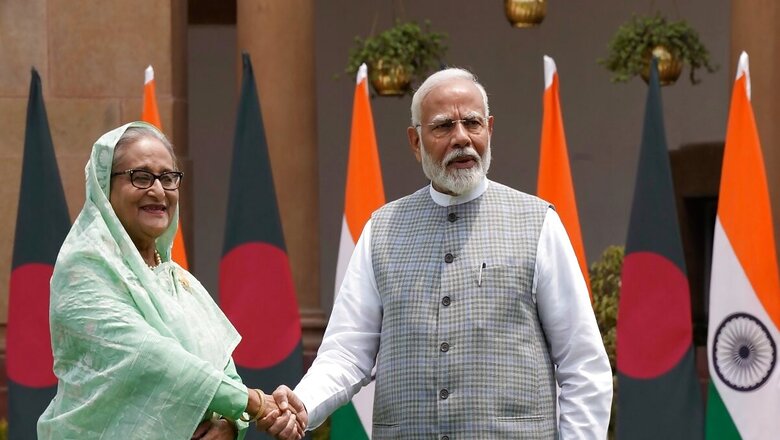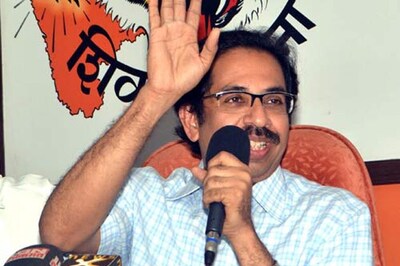
views
While the merits and flaws of the protests can be debated, what is abundantly clear is that Sheikh Hasina is nearing the end of her political career. Eventually, she will be out of power. That should send alarm bells ringing in New Delhi and trigger the formulation of appropriate plans and strategies to deal with Bangladesh in a post-Sheikh Hasina scenario.
While there are signs that the students’ protest has been hijacked by radical elements in Bangladesh, the bottom line remains this: Holding on to power is getting increasingly untenable for Sheikh Hasina. Whether it is the students that bring her fall or whether radical Islamists do so is immaterial, since her mere ouster will serve a significant blow to India’s relationship with Bangladesh.
The only real Bangladeshi leader keeping ties between New Delhi and Dhaka robust is Hasina. With her gone, bilateral ties between both countries will enter a rocky and uncertain era. One only needs to jog their memory back to the early 2000s, when radicals took control of Bangladesh and the country witnessed a parallel hike in Islamist and jihadi activities. Is India prepared for such an eventuality now? The signs do not look very promising.
While Sheikh Hasina leads the largely pro-India Awami League party, the Opposition is squarely against New Delhi. What is even more worrying is that the public mood in Bangladesh is shifting against India. The Bangladesh Nationalist Party (BNP), in fact, has been spearheading the “India Out” campaign on social media, ostensibly to woo China.
The BNP is also in an alliance with the Jamaat-e-Islami – an ultra-radical outfit that believes the liberation of Bangladesh from Pakistan was not really needed. The very same Jamaat has been referred to by the United States as a “moderate Islamic party.” That, when seen in consonance with Washington’s overarching anti-Sheikh Hasina stance, makes one fact very apparent: The US does not like to see Awami League retaining power in Bangladesh.
Luckily for Sheikh Hasina, China is on her side, for now. The BNP realises the importance of China, and to build better ties with it, the Islamist coalition will readily sacrifice ties with India. What makes the BNP-led alliance’s agenda clear is the fact that the “India Out” campaign has specifically targeted New Delhi’s economic ties with Bangladesh and called for a boycott of Indian goods.
India remains crucial to Bangladesh’s economy, given how New Delhi ranks as Dhaka’s second-largest trade partner in Asia. India and Bangladesh are also partnering on important connectivity and energy projects, all of which stand the risk of being undone if the radicals cease power in Dhaka. If it is not already clear, radicals coming to power in Bangladesh is not a question of “if” but “when”. India will be well advised to prepare for the inevitable and not appear clueless when a crisis does strike our eastern neighbourhood.
Third Front Against India: A Real Possibility?
The threat of a two-front war no longer remains a figment of the imagination of India’s security establishment. In fact, it is now viewed as a real and unavoidable possibility. The recent upsurge in terror attacks in Jammu has proven beyond any measure of doubt that Pakistan and China are actively collaborating to hurt India and wear down its troops along both the LAC and LoC. With India redeploying much of its Jammu-based troops to the LAC, Pakistan saw an opening to exploit the resultant vacuum. This is among the biggest reasons why terrorists are finding it easy to strike in Jammu, given how troop deployment south of the Pir Panjals was heavily diluted in recent times.
Now, India should brace for another equally worrying scenario – that of Bangladesh joining the China-Pakistan nexus in the near future.
As mentioned previously, the only person stopping this from happening is Sheikh Hasina. The moment power gets in the hands of the BNP-led alliance in Bangladesh, India should be prepared for a new and unique set of challenges emerging, with profound security implications for the whole of our Northeastern region. The Bangladesh Nationalist Party’s immediate goal is to turn China against Sheikh Hasina’s Awami League party. To that end, the BNP’s Foreign Relations Committee and Standing Committee have hinted at prioritising relations with Beijing. That effort is being led by a senior BNP leader, and when it comes to fruition, it will signal the “Maldives-isation” of Bangladesh.
While the BNP takes care of the sinicisation of Bangladesh’s foreign and strategic policy, the Jamaat-e-Islami would readily collaborate with Pakistan and its intelligence service to create a security nuisance for India in the Northeast. Apart from pushing jihadis into India, an anti-India government run by Islamists could also allow redundant Northeastern insurgent groups to begin their anti-India activities from Bangladesh’s soil. Given the Northeast’s thick forests, hunting such enemies down will only require more Indian troop deployment – ultimately serving both China and Pakistan’s goals.
The Jamaat’s student wing, Chattra Shibir, is already under the scanner for instigating violence in Bangladesh and hijacking the ongoing students’ protest. At the same time, Sheikh Hasina’s government is looking into the role played by Western NGOs to turn the protest into a larger popular uprising aimed at ousting the Awami League from power. If that was not worrying enough, Sheikh Hasina in March this year warned of a nefarious Western plot to carve out a Christian state using parts of Bangladesh, Myanmar and possibly even India. If this claim holds any truth, it should trigger some serious deliberations in New Delhi about how a big security challenge is on the rise in the Northeast. Given how China is making inroads into Myanmar with its “Three Brotherhood Alliance” of insurgents, it would not be an overstatement to suggest that the United States is trying to become more active in the region to counter Beijing – even if that comes at the cost of Indian interests and territory.
India enjoys a friendly relationship with Bangladesh only as long as Sheikh Hasina remains its Prime Minister. With her gone – which is inevitable – India will need to deal with a much more assertive and perhaps even hostile Bangladesh, that not only shares better ties with Beijing, but is also open to the idea of being used by Pakistan to hurt New Delhi’s interests. A broader China-Pakistan-Bangladesh nexus would severely aggravate threats faced by India in the security domain.
Views expressed in the above piece are personal and solely those of the author. They do not necessarily reflect News18’s views.




















Comments
0 comment